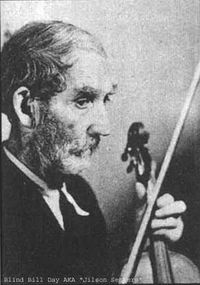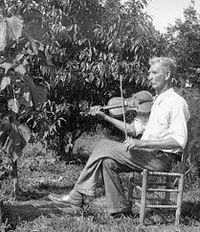Annotation:Little Boy Working on the Road (1): Difference between revisions
No edit summary |
No edit summary |
||
| Line 4: | Line 4: | ||
'''LITTLE BOY WORKING ON THE ROAD [1].''' Old-Time, Breakdown. USA, East Kentucky. A Mixolydian. Standard or AEae tuning (fiddle). AAB. Source J.W. Day recorded "Little Boy Working on the Road" in New York in 1928, and recorded for several other sides Victor in the 1920's, and for the Library of Congress and the Ohio Historical Society in the 1930's. | '''LITTLE BOY WORKING ON THE ROAD [1].''' Old-Time, Breakdown. USA, East Kentucky. A Mixolydian. Standard or AEae tuning (fiddle). AAB. Source J.W. Day recorded "Little Boy Working on the Road" in New York in 1928, and recorded for several other sides Victor in the 1920's, and for the Library of Congress and the Ohio Historical Society in the 1930's. | ||
[[File:day.jpg|200px|thumb|left|J.W. Day]] | [[File:day.jpg|200px|thumb|left|J.W. Day]] | ||
He was aided in his career by Jean Thomas, a woman who had an interest in promoting folklore and customs of the Appalachians, and who had Day assume the persona of 'Jilson Setters' (Day's father's name was Jilson Day), having him dress and act the part of a rustic, and in fact his playing style was archaic (learned from his father, with roots in the Civil War era). Most accounts suggest Day was not entirely blind and had some limited sight, although he was impaired enough to meet criteria for legal blindness. | He was aided in his career by Jean Thomas, a woman who had an interest in promoting folklore and customs of the Appalachians, and who had Day assume the persona of 'Jilson Setters' (Day's father's name was Jilson Day), having him dress and act the part of a rustic, and in fact his playing style was archaic (learned from his father, with roots in the Civil War era). Thomas called Day "The Singin' Fiddler of Lost Hope Hollow" and used the phrase as the title of a rather fictionalized biography of the fiddler. The following passage gives a flavor of her hyperbole: | ||
<blockquote> | |||
''In a windowless cabin, hidden away in a high cranny of the Kentucky mountains, lived Jilson Setters, who, for all his'' ''sixty-five years, had never seen a railroad. Neither had he heard a phonograph nor a radio. His home-made fiddle and his'' | |||
'' ‘ballets’ were good enough for Jilson Setters and mountain folk.'' | |||
</blockquote> | |||
Most accounts suggest Day was not entirely blind and had some limited sight, although he was impaired enough to meet criteria for legal blindness. | |||
<br> | <br> | ||
<br> | <br> | ||
Revision as of 05:42, 18 November 2012
Back to Little Boy Working on the Road (1)
LITTLE BOY WORKING ON THE ROAD [1]. Old-Time, Breakdown. USA, East Kentucky. A Mixolydian. Standard or AEae tuning (fiddle). AAB. Source J.W. Day recorded "Little Boy Working on the Road" in New York in 1928, and recorded for several other sides Victor in the 1920's, and for the Library of Congress and the Ohio Historical Society in the 1930's.

He was aided in his career by Jean Thomas, a woman who had an interest in promoting folklore and customs of the Appalachians, and who had Day assume the persona of 'Jilson Setters' (Day's father's name was Jilson Day), having him dress and act the part of a rustic, and in fact his playing style was archaic (learned from his father, with roots in the Civil War era). Thomas called Day "The Singin' Fiddler of Lost Hope Hollow" and used the phrase as the title of a rather fictionalized biography of the fiddler. The following passage gives a flavor of her hyperbole:
In a windowless cabin, hidden away in a high cranny of the Kentucky mountains, lived Jilson Setters, who, for all his sixty-five years, had never seen a railroad. Neither had he heard a phonograph nor a radio. His home-made fiddle and his ‘ballets’ were good enough for Jilson Setters and mountain folk.
Most accounts suggest Day was not entirely blind and had some limited sight, although he was impaired enough to meet criteria for legal blindness.

Source for notated version: James William Day {'stage name', Jilson Setters, 1861-1942, Rowan County, Tenn} [Krassen, Titon].
Printed sources: Krassen (Masters of Old Time Fiddling), 1983; p. 23. Titon (Old-Time Kentucky Fiddle Tunes), 2001; No. 93A, p. 122.
Recorded sources: Victor 40025 (78 RPM), Blind Bill Day (1928). Christian Wig & Mark Ward - "Come Back Boys and Feed the Horses: Fiddling on the Frontier".
